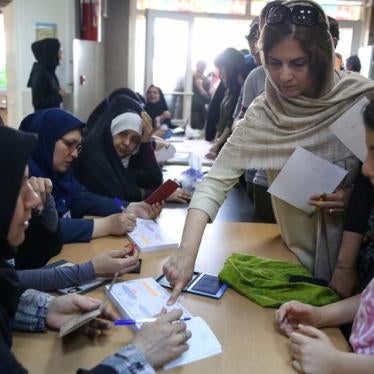(Beirut) – The Iranian authorities’ transfer of an imprisoned US doctoral student within Tehran’s Evin prison heightens fear for his safety, Human Rights Watch said today. On December 6, 2017, Xiyue Wang, a Princeton Ph.D. student and US citizen, was moved to Evin’s Ward 7 and was threatened by another inmate there in front of a guard, a knowledgeable source said.
On August 8, 2016, Iranian authorities arrested Wang, 37, who was doing research on the Qajar dynasty, Iran’s ruling monarchy that ended in the early 20th century. He has since been held in Evin prison. The Mizan News Agency, which is close to Iran’s judiciary, reported on July 16, 2017, that a revolutionary court had sentenced Wang to 10 years in prison on charges of “cooperating with an enemy state.” In September, a court of appeal upheld the sentence.
“Iranian authorities do not limit unfair trials and mistreatment in custody to their own citizens but impose them on foreign nationals as well,” said Sarah Leah Whitson, Middle East director at Human Rights Watch. “To further threaten Xiyue Wang with physical harm is outright cruelty.”
The source told Human Rights Watch that after Wang’s transfer on December 6, “his life was immediately threatened [in front of a prison guard] by a Taliban inmate who was previously imprisoned at Bagram Airbase in Afghanistan.” After the US-led invasion of Afghanistan in late 2001, the US Central Intelligence Agency held and frequently tortured or ill-treated many detainees at Bagram. The same inmate threatened Wang when they were both detained in Ward 209, which led to his transfer to a different cell.
On November 26, 2017, the Islamic Republic of Iran Broadcasting Agency claimed that Wang had traveled to Iran to obtain documents from the Iranian Foreign Ministry, National Library, and Parliament on behalf of the US government.
Princeton University has stated that Wang: “was in Iran solely for the purpose of studying Farsi and doing scholarly research in connection with his Ph.D. dissertation… His dissertation topic was not suggested to him by Princeton, the U.S. government, or anyone else… He has no connection to any government or intelligence agencies, and the charge that he was engaged in espionage is completely false. He studied the archival materials solely for his own research, and to our knowledge did not share them with anyone at Princeton or elsewhere.”
Over the past two years, Iran has arrested several dual Iranian and foreign nationals on allegations of cooperation with Western countries. In August, a court of appeal upheld a 10-year prison sentence for Siamak Namazi, a dual Iranian-US citizen who was the head of strategic planning at the Dubai-based Crescent Petroleum, and his 80-year-old father, Bagher Namazi, a former representative of the United Nations Children’s Fund (UNICEF) on similar charges. Nazanin Zaghari-Ratcliffe, a dual Iranian-British citizen who worked for the Thomson Reuters Foundation, is serving a five-year prison sentence and has also been threatened with new charges, her family told Human Rights Watch.
Boris Johnson, the UK secretary of state for foreign affairs, is traveling to Tehran on December 9, and is expected to raise Zaghari-Ratcliffe’s case with Iranian officials. On December 8, Alireza Rahimi, a member of Iran’s Parliamentary National Security Commission, confirmed that Iran and the UK will discuss the case.
“Iran should stop using the arbitrary arrest and mistreatment of foreign nationals as a component of its foreign policy and treat everyone, citizen and foreigner alike, with respect for their basic human rights,” Whitson said.









